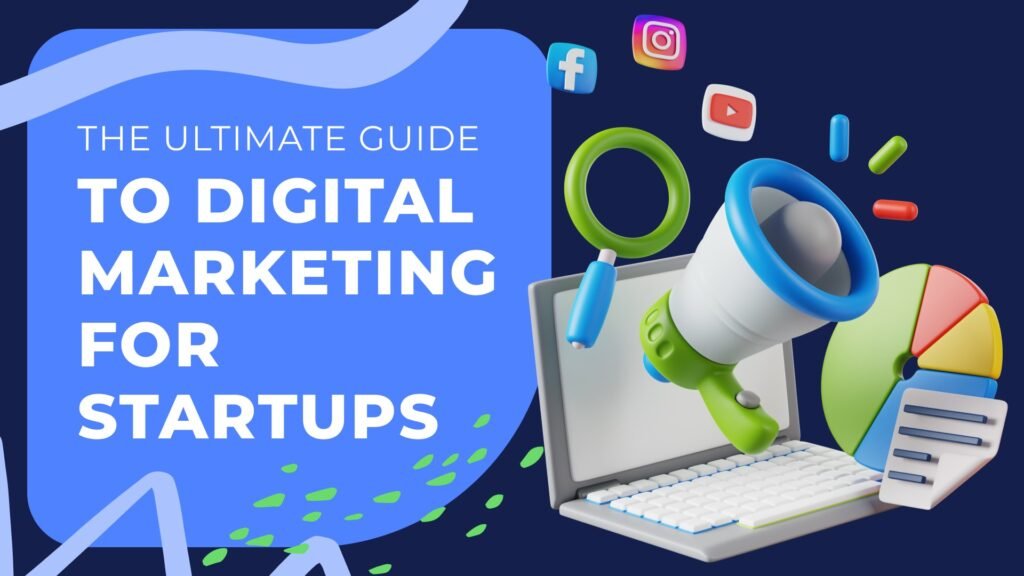The excitement of finally launching your startup is second to none. After all the time spent planning and creating, you’ve brought your idea to the marketplace, and your wildest dreams are ready to come true. Then, someone asks about your digital marketing strategy. Your what?
When the marketplace has no idea who you are yet, how do you make your brand known when you’re new? Our team at NinjaPromo are experts in international marketing strategy, and we asked them to share the best information about digital marketing strategy for startups.
Importance of Digital Marketing for Startups
In the old days, when you had a new company, you relied mainly on word of mouth and physical advertising (like billboards or fliers) to capture your audience’s attention. If you were fortunate and had a massive budget, you could film commercials for television. While those things remain important today, the revolutionary digital marketplace known as the Internet completely changed the game, especially for businesses just starting out.
The playing field has become level for startup companies. You can be launching your business and your digital marketing campaign at the same time from the comfort of your home. Your path to getting in front of your potential customers has gotten a lot smoother. Having the right digital marketing for startups can boost your growth quickly, saving you valuable time and money.
Overview of Current Digital Marketing Trends for Startups in 2024
A startup business, by necessity, has different goals and resources than an established multinational corporation. So, while the tools may be the same for both, the digital marketing strategies for startups should differ.
Smart startups realize they need a digital marketing strategy and know that using a full-service digital marketing agency is the best investment. These digital marketing teams often have decades of experience launching a new brand and offer support beyond creating content. They can help you:
- create your brand
- consult on the next steps, and
- run your social media calendar.
Help like that in the early days of your business is invaluable.
Let’s look at the main trends for digital marketing for startups, focusing on the ones you should spend your early energy on.
Best Digital Marketing Strategies for Startups in 2024

Develop High-Quality Content
It’s not enough to take a few photos and throw them onto your feed. You need to take great care in curating your content to get the right eyes on you. This brings value to your potential customers, making them trust your brand.
This point is especially vital for startups who are on the hunt for future investors. When it comes to investors taking a chance on your brand, you need to demonstrate you have a quality product or service and professional attention to detail. By having consistent, high-quality content, you attract the right kind of partners.
Implement Social Media Strategies
In the same way, “posting a whole lot” isn’t a digital marketing strategy for startups but rather an easy way to get burned out and frustrated. Working with a digital marketing projects team is a wise investment of time and money–giving you the benefit of their professional experience to make the right game plan to break into your market.
What established companies do is not the same for you when you begin digital advertising. Big brands have equally big budgets and reputations, so they can launch a new product or service by linking it to a proven one. For startups, the best first move is to build that online brand in a more personal way.
We’ll discuss some of these digital marketing strategies for startups in detail further down the list.
Invest in Paid Advertising (PPC)
Have you noticed when searching for a product or service that some results you receive will stand out from the rest? They may have a small ‘sponsored’ tag or be in bold type and larger than the others. These are all examples of paid advertising. Companies and brands have paid the search engine or social network to pop up at the top (or several times within) the search results.
Pay-per-click works exactly as it sounds. Each time your advertising gets clicked on, you pay the provider (search engines like Google Ads and social networks like Facebook and Instagram Ads offer this for businesses.)
The challenge here for startups is the temptation to immediately purchase advertising without first doing the proper research on their audience. Thinking that simply paying for the space will instantly bring in cash flow causes frustration and disillusionment–two things a new business owner certainly does not need. Digital marketing efforts include analyzing data to determine the best-paid advertising and performance marketing strategy and eliminating costly and sometimes fatal mistakes.
Optimize Your Knowledge Base
The most important thing for your business, bar none, is data. The data you collect regarding your business and digital marketing strategy informs your every decision and saves you from countless pitfalls and dead ends. What kind of data are we talking about?
Analytical data can be very simple:
- your audience
- where they live
- how old they are
- where they shop.
You can drill even further down using the many tools available today to see how they behave on your website, how they interact with your content, and even when (and if!) they open your emails. All of this is gold when it comes to making a digital marketing plan.
Every business is unique, and with the help of a digital marketing agency for startups, you can optimize your toolkit with the right data at the right time. Your decisions are only as good as your data, so having an experienced team to guide you into what to focus on, you can be assured of success.
Use Email Marketing
Sure, we all know the power of social media, and for a startup, using popular social media platforms is a must to get your name and brand out into the world. But how often have you and your colleagues complained about not getting the attention you’d hoped for due to the dreaded “algorithm”? Social media platforms have certain bits of code called algorithms that determine what a user sees by looking at their past behavior.
For example, someone who follows makeup influencers and likes or shares their posts will more often receive ads for makeup tools and products. If suddenly that person starts interacting with accounts about woodworking or surfing more than makeup, their social feed will then start to show them ads for online woodworking courses or surfboards. It’s not great if you’re launching a new mascara–there goes your audience.
How do you solve being at the mercy of the algorithm? Email marketing. It’s maybe the most important part of digital marketing strategy for startups, so we’d like to talk about it for a bit.
Email has so many advantages, particularly for startup businesses. The average email marketing campaign has an ROI (or Return On Investment) of $36 to $40 for every $1 the business spends. With your mailing list, you have the names and emails of people truly interested in what you have to offer–what digital marketing strategists call ‘warm leads.’ You always have a way to get in touch with them when and how you want to, even tailoring messages (called segmentation) to give a more personalized experience with your brand based on their past purchases or behavior.
Email marketing platforms range from simple to complex, with tools and premade templates to make your newsletter creation a breeze. Most are user-friendly to a fault and offer video tutorials and customer service chat if you run into trouble. Costs range from low to high, although in most cases, when your list is small (below 500 or 1000 names), you can still use the email platform in a limited way for free.
Using small business marketing companies for email is one of the most cost-effective choices you can make as a startup. A professional team knows how to achieve good digital marketing results for startups by using email in a variety of ways–from a welcome series for new signups to an abandoned cart series with discounts as incentives. By having all of these funnels automated to send at scheduled times, you never have to worry about customer service having an endless list to follow up on.
Invest in Website Optimization (SEO)
Unlike paid advertising or social media, SEO doesn’t have an immediate payoff. You can’t ‘see’ it working like you can the shares or saves on a video. Optimizing your website isn’t creative or fun, but it’s essential. Here’s an example.
- You’ve just launched your dream company, creating fine paints for specialized art restoration.
- Your website is attractive and gives the feel of elegance that would impress your ideal customer.
- But nowhere on your website do you have any references to the particular projects that your customer does. It says that you create and sell paints for fixing things, and they’re expensive.
When someone uses digital platforms to find “paints for art restoration,” that search engine reaches into its brain to find the places on the web where that combination of words happens the most frequently, deciding on the websites that best answer the request. Search engine marketing serves to up the websites that pay for its service. Can you see how, if you had those specific words “paints for art restoration” on your website even a few times, how much more likely that person would find your brand? When it’s something as specific as this example, it’s critical to that business’ success, as their market is smaller than arts and crafts.
Search Engine Optimization is the most efficient way among digital marketing solutions. It costs nothing, converts customers better than any other form of traffic, and boosts your visibility in the background while you focus on other digital marketing channels. For creating your SEO strategy, it’s in your best interest to work with SEO companies for small business who can make plans tailored to your unique needs.
Create Compelling Video Content
When you’re aiming to generate buzz in a new market, it’s important to have video content as the main tentpole of your digital marketing strategy. Why? Well, especially in retail, you have to replace the in-store experience that most customers rely on to decide if a product is right for them.
Including a video on a website’s landing page or a digital platform like YouTube creates an instant and intimate way to connect and an easier way for your viewers to become your customers. Almost three-quarters of people who watched a video about a product then went on to purchase–and that’s a much better result than brick-and-mortar can provide.
Another important element of compelling video content is one of the most crucial for startups–building trust. By engaging with your audience and showing them not only what you’re selling but what your brand stands for, you foster an emotional connection that leads to lifelong customers who spread the word about your product or service. It doesn’t have to be Hollywood quality, either–it only needs to be authentic and memorable in a digital marketing realm.
And back to those aforementioned search engines–they love it when you have video on your site. Video motivates users to stay on your site longer, therefore flagging it as more legitimate and helpful.
What kinds of video content can you use? Everything from product reviews to testimonials is excellent for a startup to show the trust they’ve already garnered with real people while doing a live broadcast, which can add an air of excitement and exclusivity to your product launches. (It certainly works for Apple, who boast over 30 million viewers each time they have an event!) Using video in your digital marketing by utilizing free video editor online tools to create and edit them is worth the effort if you want to produce video content initially within budget.
Leverage Influencer Marketing
On the subject of video being an important product marketing strategy, nowhere is this more familiar than in the world of influencer marketing. Before the internet, influencers were usually celebrities, politicians, or sports heroes hawking their favorite cereal or automobile. Being a spokesperson for a brand became a very lucrative way for companies to establish themselves apart from the crowd.
Now, social media has made regular people the ones we look up to and take advice from when it comes to purchasing behavior. Influencers are now the hottest commodity when it comes to digital marketing strategy, especially for lifestyle brands and travel companies.
Startups should harness the power of influencer marketing within their digital marketing strategy for several reasons.
- The right influencers have a built-in audience devoted to their posts, so aligning your brand with them gives you a ready pool of potential warm leads.
- This makes it easy to target a particular market at a certain time, increasing engagement with your social media accounts as a bonus.
- Also, depending on the level of the influencer, this can be a very cost-effective method versus more traditional marketing channels.
Larger multinational corporations have seen this trend grow and find themselves trying to keep up by turning influencers into mainstream celebrities, posing with and reviewing their products. But that shouldn’t dissuade startups from using this channel to gain traction. Your digital marketing strategy might benefit from the awareness an influencer brings.
Run Retargeting campaigns
There’s nothing more irritating than creating an advertising campaign that gets a flood of interest and views but doesn’t end up converting into sales. Of course, there will always be people who change their minds. But could there be ways you’ve missed connecting with some of these potential customers, and can you right that wrong? You can do so by running a retargeting campaign.
Retargeting is just as it sounds–finding ways to get that almost-customer to come back and give your brand a second look, but this time making a conversion too compelling to avoid. The easiest way to do this is by using special tracking, often referred to as “cookies,” to indicate to search engines that they’ve visited your website or shop before. When a search engine like Google sees that they’ve already interacted with you, they’ll nudge them again with a paid ad.
Retargeting can also be valuable for your past customers as an easy way to introduce new products or services to them. This is a great option when these customers aren’t consistently active on your website, giving them the feeling of being ‘in the know’ and personally encouraging them to come back and catch up on what’s new.
Optimize for Mobile Devices
Almost 91% of Americans say they buy things online using a smartphone–that’s nearly 9 out of 10. One in three say they shop online with their mobile device at least weekly, with a smartphone far outdistancing a computer or tablet. So why do so many startups forget to make sure their brand is at its best on a cell phone?
So much time and effort goes into an attractive website or a splashy ad campaign–but what good is that if 91% of the potential audience is still waiting for your site to load? Or can’t find the ‘buy now’ button?
Putting the optimization of your website and shop on mobile devices should be at the top of your list–everything from correcting the size of your image files to making sure your best content is served up first and adapting your website to increase your loading speed. And while all of that can sound like high-tech gobbledygook, it can easily be solved by hiring web design services for small business who can support you by ensuring everything is buttoned up tightly. It’s too important to overlook.
The Importance of Testing and Optimizing Your Strategy Based on Results
You’ve done all of this work–now what? Cross it off your to-do list and hope for the best? Of course not. As important as it is to create digital campaigns in the first place, it’s even more important to test and optimize them. You may have heard the term “A/B testing,” which is one of the most vital things to include in a digital marketing strategy for startups. A/B testing means creating two different ways to communicate your sales message and then sending out the A message to one group of your audience and the B message to another. It could be as simple as changing the imagery of the advertisement or the order of how your sales message is worded.







